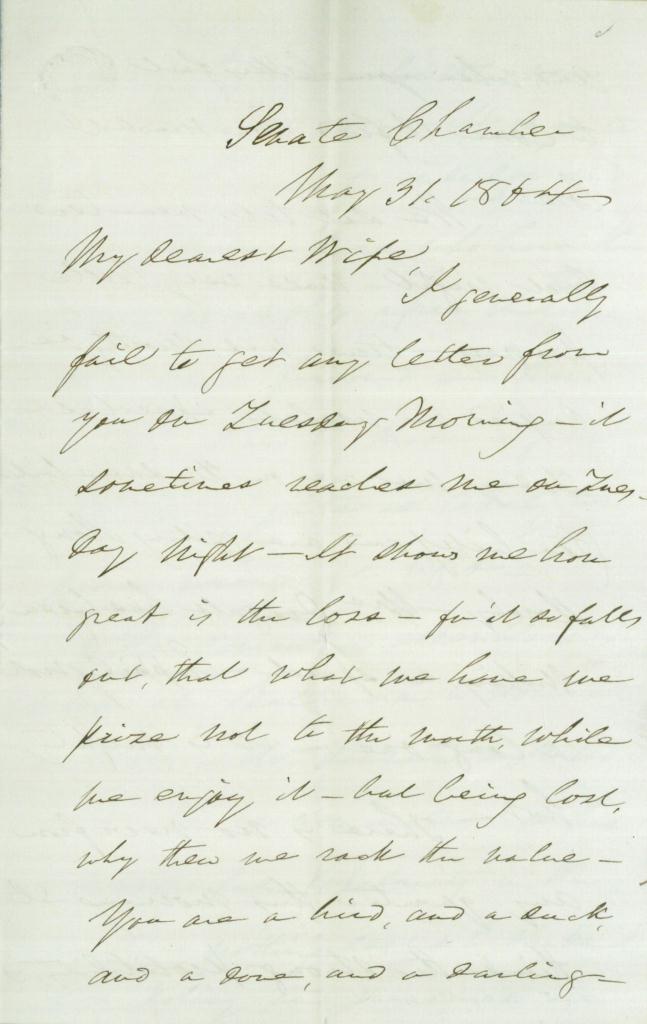By Susan Martin, Collection Services
It can sometimes be difficult to comprehend the scale of the Civil War and to realize how deep an impact it had on the lives of families far and wide. Then something comes along that really drives the point home.
The MHS recently acquired a collection of the papers of Joseph E. Worcester, publisher of dictionaries, almanacs, gazetteers, atlases, and other reference works. While most of the collection relates to his lexicographical career, one letter, written in the midst of the Civil War, caught my eye. On 20 Apr. 1863, Joseph wrote to his sister Deborah (Worcester) Loomis from his home in Cambridge, Mass. The letter starts out simply enough: Joseph discusses some family business related to the death of their brother-in-law Daniel French and the disposition of French’s property. Then he changes the subject:
You know, I suppose, that we have eight nephews in the army, but how recent information you may have had respecting them, I know not. Henry P.’s wounded ancle [sic] is healed, and he has joined his regiment, and is now, or was recently, at Falmouth, in Gen. Hooker’s army. Charles, John, and William, who have passed most of the winter at St. Augustine, Florida, are now in South Carolina – were well early this month. Henry, br. G.’s son, has seen hard service in N.C. – has been very ill, and is now, I suppose, in the hospital at Port Royal. He will be, as I hope, soon discharged, if he is not already. I have seen a letter from Leonard’s son Edward, dated the 24 of March at Camp Farr, near New Orleans. He was in good health. Brother David’s sons Frank and Edward, who enlisted and left Bangor in February are now, I suppose, at Fort Alexandria, near Washington. It is to be hoped, though hardly to be expected, that all these young men will return in due time to their friends.
I was intrigued, so I set out to identify the (mind-boggling!) eight soldier nephews and learn their fates—no mean feat considering the size of the family. Joseph was one of fifteen children of Jesse and Sarah (Parker) Worcester of Hollis, N.H. Those fifteen siblings had, according to The Worcester Family: The Descendants of Rev. William Worcester, a total of nearly fifty children. Many of that generation’s young men died on the battlefields of the Civil War, and Joseph was right to be guarded in his optimism.
So how did the Worcesters fare? Amazingly, it turns out that seven of Joseph’s eight nephews survived the war—all except 24-year-old John Howard Worcester (1839-1863). In fact, John died on 26 July 1863, just three months after this letter was written, from wounds received during the infamous assault on Fort Wagner, S.C. The rest of the nephews did, in fact, “return in due time to their friends.” Taking them in order…
Henry Parker Worcester (1839-1882) was a member of the 3rd Maine Infantry and saw action at Fair Oaks, Wilderness, and Bull Run. Wounded twice and promoted multiple times, he finished his service as a captain. After the war, he settled in Norfolk, Va.
Charles Henry Worcester (1837-1919), the aforementioned John, and William Worcester (1840-1895)—Charles and John were brothers, and William their cousin—served together in the 7th New Hampshire Infantry. After the war, Charles went into business with his three other brothers and, as far as I can tell, lived the longest of the eight nephews. William died of heart trouble at the age of 55.
Henry (1842-1911), William’s younger brother and a member of the 24th Mass. Infantry, was, as his uncle Joseph hoped, discharged due to illness. Henry became a leather manufacturer, post commander of his local G.A.R. #40 in Malden, Mass., and a Civil War historian.
Edward Joseph Worcester (1831-1893) of the 42nd Mass. Infantry was the only one of the eight with a wife and children at home when he enlisted as a “hundred days man.” Happily he returned to his family and had two more children with his wife Maria.
Francis D. Worcester (1843-) was a member of the 1st Maine Heavy Artillery. He survived the war but may have suffered from mental illness later in life. His brother Edward Lewis Worcester (1845-1897), the youngest of the eight, also served in this regiment and went from private to first lieutenant over the course of the war. He later settled down as a farmer in Iowa.
After updating his sister Deborah on the status of their soldier nephews, Joseph wrote more broadly about the conflict itself:
This most iniquitous war, after two years of most destructive prosecution, seems now no nearer a successful termination than it did one or two years ago. I have all along had a hope that the war would lead to the extermination of the cause of it, that is slavery, but whether this will be effected seems doubtful. I think slavery is a much greater evil than the people of the Free States have considered it, but it is an evil that is very difficult to get rid of without the concurrence of the slaveholders. We know not what the designs of Providence may be, but we may hope good will come in some way.


